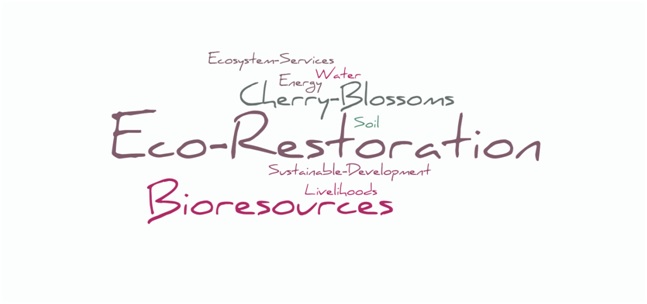
Albert Chiang
Albert Chiang, PhD
Designation/Position: Scientist-C (Restoration Ecology)
Department/Programme Name: Animal & Plant Resources
Phone: 0385-2446122
Academic Qualifications
• 2010-2014, Wellcome Trust-DBT India Alliance Fellow, National Centre for Biological Sciences, Bangalore (Tata Institute for Fundamental Research)
• 2011-2013, Honorary Research Associate , University College London(UCL), UK
• 2003-2010, Ph.D, National Centre for Biological Sciences, Bangalore (Tata Institute for Fundamental Research)
• 1997-1999, Department of Zoology, North Eastern Hill University, Shillong
Experience
• 2017-2020, Scientist C, Institute of Bioresources and Sustainable Development (IBSD)
• 2015-2017, Scientist (Contractual), Institute of Bioresources and Sustainable Development (IBSD)
• 2000-2003, Lecturer, Lady Keane College, Shillong
Awards & Fellowships
2016: Panelist, North East Green Summit 2016 on 5 November 2016 , at Tura, Meghalaya, organized by Vibgyor media Solutions and co-hosted by NEHU and Don Bosco College, Tura
2016: Special Invitee , Meghalaya Biodiversity Board, Govt of Meghalaya, 19 September 2016 (also invited for consultation meeting for State Climate Action Plan)
2015: Member of DBT India- Stanford University Joint Team for Foldscope usage and tutorials at Delhi, Guwahati and Kaziranga National Park
2015: Resource Person/Panelist, Second Regional Multi-stakeholder Himalayan Sustainable Development Forum on October 05, 2015 at National Institute of Rural Development & Panchayat Raj, North Eastern Regional Centre (NIRD&PR-NERC), Khanapara, Guwahati. organized by G.B. Pant Institute of Himalayan Environment & Development (GBPIHED)
2015: Organizing Secretary, National Workshop on Conservation and Sustainable Management of Sangai, April 16-17 , 2015, organized by IBSD
2010-14: Wellcome Trust-DBT India Alliance Early Career Fellowship (Rs. 1.2 Crores)
2009: IBRO-SfN (IAC-USNC) International fellowship for attending the 39th annual meeting of the Society for Neuroscience at Chicago, USA, 17-21 October, 2009 (US$ 1500), supplemented by the MBL-CSHL Alumni travel award from IBRO (US$ 2000)
2009: EMBL Award to meet tuition, lodging and travel costs to participate in the EMBL Practical Course on Current Methods in Cell Biology (€3500), supplemented by travel award from DST (India) (Rs. 70000)
2009: National Institute of Health (NIH) travel grant (from the organizers) to attend the Keystone Symposia on ‘Chemical Senses’- March 15-19, 2009. (US$ 1000) supplemented by travel award from CSIR (India) (?80000) and CCSTDS (India) (Rs. 20000)
2007: IBRO Travel Grant for an oral presentation at the 2007 CSHL Synapses meeting, New York (US$ 2000) supplemented by a Travel Grant from the Company of Biologists (£500)
2007: IBRO-SfN (IAC-USNC) International fellowship for defraying tuition and travel costs for attending the ‘Neurobiology of Drosophila’ course at Cold Spring Harbor Laboratory, USA (US$ 5500)
2006: Best poster award at the National Centre for Biological Sciences (NCBS) Annual Research Talks
2003-09: Kanwal Rekhi Career Development Award
2003-09: TIFR Graduate Research Fellowship
1999: CSIR-UGC NET for Junior Research Fellowship and Lectureship (declined)
1999: Citation Award-Prof. M.K. Khare Award for securing the highest marks in M.Sc. Zoology, 1999, NEHU, Shillong
Memberships (Professional Associations / Societies)
• 2016- present, Member , Core Organizing Committee, India International Cherry Blossom Festival Shillong, organized by Govt. of Meghalaya, IBSD and ICCR
• Member of Society for Ethnopharmacology (SFE)
Specialized Training
• 2009, EMBL Practical Course on Current Methods in Cell Biology , Heidelberg, Germany
1. Research theme photo

2. Verticals involved
Eco-Restoration
3. Research Area/Research Expertise
• Biodiversity Assessment & Economic Evaluation of Ecosystem Services of Different Ecosystems
• Development of Bioresources based Eco-Tourism for sustainable livelihoods
4. Research Summary
A. Current Research:
Eco-Restoration
This year 2020 marks the end of the Decade on Biodiversity (2011-2020). This has come about from the Convention on Biological Diversity (CBD) – who broad goals are (a) to protect biodiversity, (b) to use components of biodiversity sustainably, and(c) to share the benefits arising from genetic diversity equally. These will now carried over to a future framework to fulfil the 2050 vision of Living in Harmony with Nature, wherein biodiversity is valued, ecosystem services maintained, and a healthy planet sustained, thereby delivering benefits for all. Further, the coming year 2021 will mark the start of the UN Decade on Ecosystem Restoration (2021-2030) which will further catalyze efforts to blend landscape restoration with biodiversity conservation. It has also been increasingly appreciated that ecological restoration in areas of environmental degradation can help reverse global biodiversity losses, as well as promoting recovery of ecosystem services. North East India, comprising of 8 states ( with only 8% of India’s geographical area and 4% of the country’s population) contains more than one-third of the country’s total biodiversity, and a quarter of the country’s forests and one-third of the country’s water resources. While one third of India's runoff flows from the Northeast through the Brahmaputra and Barak rivers, the Manipur river drains to the Loktak Lake, the largest freshwater wetland of North East India. These huge trans-boundary river basins (covering 8% of India’s geographical area), consists of seasonally flooded wetlands that sustain a broad range of biodiversity. However, despite the richness of natural resources, several states of North East India still lag behind the rest of the country in socio-economic development. Accordingly, the biodiversity of North East (NE) India (and this region has been aptly called India’s Natural Economic Zone (NEZ), Region by Shri Narendra Modi Ji, Hon’ble Prime Minister of India) is very important globally and more so, very significantly for the local peoples’ livelihoods. Biodiversity is a resource with huge potential, both for intellectual and economic purposes and as an instrument for a country’s development.
• Biodiversity Assessment and Economic Evaluation of Ecosystem Services
Despite the North East Indian Region’s recognition as a biodiversity hotspot, biodiversity information is generally restricted to species inventories for specific locations, mainly the protected areas. Important data such as distributional patterns and population dynamics are unavailable, except for very few species. Documentation and systematic analysis of the region's biodiversity is vital to understand correlations between richness and distributional patterns, relationships between landscape variables and species composition, impacts of habitat fragmentation, and the role of biological corridors. Thus, the knowledge obtained through inventories and scientific studies and their utilisation and appreciation by society, plays an essential role in ensuring the long-term conservation of the country’s protected areas and natural resources. All of these are vital for determining management strategies for the biodiversity resource and options on how to make use of it in a culturally appropriate manner for the sustainable ?improvement of people's lives (adapted from Joint Report of World Bank Ministry of DONER, Govt. of India, 2007). Moreover, the effects of climate change is already evident, with the rise in both flood and drought incidences in this region. With the increasing population, there are also several anthropogenic threats to the biodiversity of North East India which include among others, habitat loss , deforestation with changes in land use, agriculture , forest fires, illegal extraction and the wildlife trade, introduction of exotics, uncoordinated infrastructure development and immigration.
The region is also home to more than 200 out of 450 of India's tribes, the culture and customs of which have an important role in providing lessons for biodiversity conservation. With the central Government’s thrust for the development of North East India, which will involve huge development projects, it is imperative that a scientific assessment of the biodiversity and the hydrology of the vast inland freshwater resources of North East India, so that conservation and eco-restoration plans, involving community participation, can be developed that are culturally and locally appropriate and sustainable, in this United Nations Decade on Biodiversity, which is now passing on to the United Nations Decade on Ecosystem Restoration
In this group, we are developing local specific evaluations of the biodiversity and the natural capital so that appropriate eco-restoration programs can be implemented to reverse biodiversity losses and restore ecosystem services, so that the benefits can be shared and benefit all.
• Identification of Unique Bioresources of NER to promote the Eco-Tourism potential of NER
IBSD has been instrumental to setup the initiative of India’s First Cherry Blossom Festival at Shillong since 2015. The India International Cherry Blossom Festival Shillong is now an annual state tourism festival , organized by the Government of Meghalaya, IBSD and ICCR